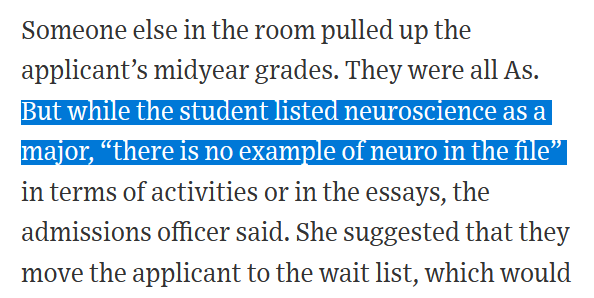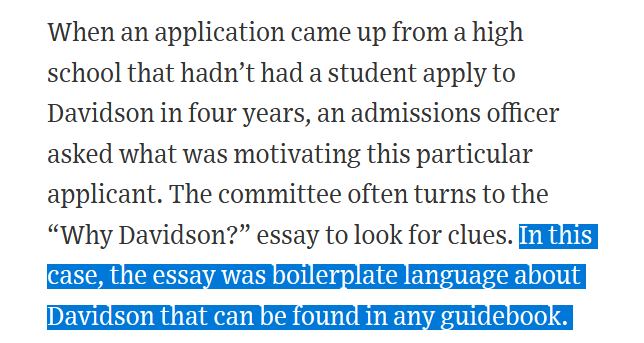Thread: Over eight years ago, I laughed because students who made this video thought admissions officers actually talked like this. This was created by the Princeton Tiger. https://youtu.be/3tiUELkyQFg ">https://youtu.be/3tiUELkyQ...
This morning, I read this by @jselingo https://www.wsj.com/articles/the-secrets-of-elite-college-admissions-11598626784">https://www.wsj.com/articles/...
This reminds me of a dinner I had 10 years ago with people from some colleges and a CBO. The AO from one of the super-selective institutions said, (after engaging in "my admit rate is lower than yours" sparring with another) said almost the exact same thing to the CBO director.
I got a little annoyed and probably spoiled the dinner by pointing out that maybe the kids who work with the CBO didn& #39;t have parents who were doctors, or parents who& #39;ve been telling them since fourth grade how to impress admissions committees. One rep almost got the vapors.
Another obnoxious trend: Expecting 17-year-olds to be fully actualized adults. And to be able to a) read the mind of the AO, and b) know this stuff without high-priced help.
Four years ago I wrote about the unfairness of LORs. It apparently hasn& #39;t changed much. Now it& #39;s the teacher who is the one being reviewed, not the student. Fair? https://www.washingtonpost.com/news/grade-point/wp/2016/03/03/letters-of-recommendation-an-unfair-part-of-college-admissions/">https://www.washingtonpost.com/news/grad...
If this high school is Andover (it ain& #39;t), it& #39;s probably a good call. If it& #39;s a rural high school from which no one has applied because most of that school& #39;s kids don& #39;t go to college, it& #39;s about as crappy an excuse as you can think of.
It& #39;s rare that students are penalized for having well-educated parents (although these applicants could be children of campus security officers, or food service staff making minimum wage.) Either way, this is also pretty arbitrary.
This arbitrariness is both the problem and the appeal of these places. Don& #39;t tell the economists this, but the market of 17-year-olds and the parents who live vicariously through them is decidedly not rational.
As I& #39;ve said before, if you want wealthy people to want something even more, just tell them they can& #39;t have it.
And for low-income kids? Sell the dream, the chance to grab the golden ring.
And for low-income kids? Sell the dream, the chance to grab the golden ring.
And yes, I know the places profiled here are not garden variety admissions shops. That too, is the point. An article about how most colleges admit most applicants is not news.
No one would buy that book. And I wouldn& #39;t blame them.
No one would buy that book. And I wouldn& #39;t blame them.
So there is a cozy relationship here: The advantages of having your Admissions Office exercise and demonstrate privilege profiled in a book and reported in the WSJ is that parents who read the WSJ will have another scarce commodity to pursue (you hope.)
The disadvantage is that I will probably tweet about it, and wonder--as I have in the past--whether the admissions places at highly selective colleges aren& #39;t part of the access problem we have in America.
They don& #39;t pull this approach out of thin air: It& #39;s passed down to them.
They don& #39;t pull this approach out of thin air: It& #39;s passed down to them.
We can do better. But just like the media thinks there are only 50 colleges in America, their focus on those 50 colleges, and the behavior of those admissions officers, affects all of us.
We can do better. And we should. Especially now.
We can do better. And we should. Especially now.
It& #39;s no wonder people don& #39;t believe us when we say "Test optional means test optional."
It& #39;s not surprising we have a lack of trust. It& #39;s not surprising people with means try to game the system.
But it is, it seems, understandable.
Do better, admissions.
It& #39;s not surprising we have a lack of trust. It& #39;s not surprising people with means try to game the system.
But it is, it seems, understandable.
Do better, admissions.
Oh, and #EMTalk

 Read on Twitter
Read on Twitter








